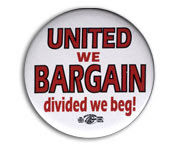On April 19, 2005, a bipartisan coalition reintroduced into Congress the historic Employee Free Choice Act (S. 842 and H.R. 1696). The act would strengthen protections for workers’ freedom to choose by requiring employers to recognize a union after a majority of workers sign cards authorizing union representation. It also would provide for mediation and arbitration of first-contract disputes and authorize stronger penalties for violation of the law when workers seek to form a union.
Summary of Employee Free Choice Act
The Employee Free Choice Act (S. 842, H.R. 1696) was introduced as bipartisan legislation in the 109th Congress on April 19 by Sens. Edward Kennedy (D-Mass.) and Arlen Specter (R-Pa.) and Reps. George Miller (D-Calif.) and Peter King (R-N.Y.)
1. Certification on the Basis of Signed Authorizations
Provides for certification of a union as the bargaining representative if the National Labor Relations Board finds that a majority of employees in an appropriate unit has signed authorizations designating the union as its bargaining representative. Requires the board to develop model authorization language and procedures for establishing the authenticity of signed authorizations.
2. First-Contract Mediation and Arbitration
Provides that if an employer and a union are engaged in bargaining for their first contract and are unable to reach agreement within 90 days, either party may refer the dispute to the Federal Mediation and Conciliation Service (FMCS) for mediation. If the FMCS has been unable to bring the parties to agreement after 30 days of mediation the dispute will be referred to arbitration and the results of the arbitration shall be binding on the parties for two years. Time limits may be extended by mutual agreement of the parties.
3. Stronger Penalties for Violations While Employees Are Attempting to Organize
or Obtain a First Contract Makes the following new provisions applicable to violations of the National Labor Relations Act committed by employers against employees during any period while employees are attempting to organize a union or negotiate a first contract with the employer:
a. Mandatory Applications for Injunctions: Provides that just as the NLRB is required to seek a federal court injunction against a union whenever there is reasonable cause to believe that the union has violated the secondary boycott prohibitions in the act, the NLRB must seek a federal court injunction against an employer whenever there is reasonable cause to believe the employer has discharged or discriminated against employees, threatened to discharge or discriminate against employees or engaged in conduct that significantly interferes with employee rights during an organizing or first contract drive. Authorizes the courts to grant temporary restraining orders or other appropriate injunctive relief.
b. Treble Back Pay: Increases the amount an employer is required to pay when an employee is discharged or discriminated against during an organizing campaign or first contract drive to three times back pay.
c. Civil Penalties: Provides for civil fines of up to $20,000 per violation against employers found to have willfully or repeatedly violated employees’ rights during an organizing campaign or first contract drive.
=======
This fact sheet has been prepared by the AFL-CIO. For more information regarding the Employee Free Choice Act, please contact Maria Fiordellisi at 202-639-6239.
Summary of Employee Free Choice Act The Employee Free Choice Act (S. 842, H.R. 1696) was introduced as bipartisan legislation in the 109th Congress on April 19 by Sens. Edward Kennedy (D-Mass.) and Arlen Specter (R-Pa.) and Reps. George Miller (D-Calif.) and Peter King (R-N.Y.).AFL-CIO•April 2005.
See also American Rights at Work.
The AFL-CIO has produced a hands-on toolkit for student and faculty supporters of workers' rights. The toolkit features ideas for teach-ins, checklists for planning, sample leaflets, fact sheets, discussion questions and other materials. To order, call 202-637-5102 or e-mail bboyce@aflcio.org.
Subscribe to:
Post Comments (Atom)




1 comment:
I am currently facing the very vague situation of sexual harassment which is causing a hostile work environment where I currently work.
How can you prove that you are treated differently from your fellow co-workers and made to tow the line so to speak when others do not have to?? How will a union for librarians assist with this sticky matter???
Post a Comment